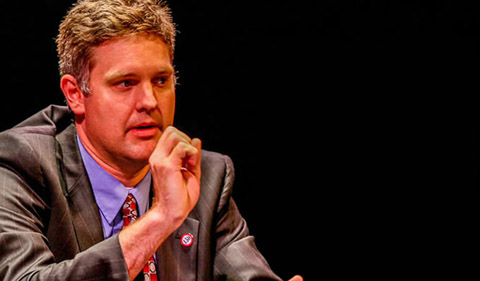
Dr. Brian Schoen. Photo courtesy of the Virginia Sesquicentennial of the American Civil War Commission
Dr. Brian Schoen was part of an international panel that discussed the 1863 Battle of Gettysburg—one of the iconic battles of the American Civil War—on the radio show Talking History with Patrick Geoghegan.
Schoen, Associate Professor of History at Ohio University, is the Fulbright-sponsored Mary Ball Washington Professor of American History at University College Dublin in Ireland for the 2014-15 academic year.
The panel also included James McPherson, Professor Emeritus of History from Princeton University, and Allen Guelzo, Professor of History at Gettysburg College.
Schoen’s research in Ireland focuses on “Situating the United States Civil War in an Era of Global Violence and Political Instability.” His teaching, he says, has focused on getting Americans to think of their own history in a broader global context. In Ireland, he is accessing primary and secondary material available only in Ireland as he works on a book manuscript examining the origins and meaning of the U.S. Civil War in the context of other contemporaneous nationalist movements, including Irish independence, and within broader transatlantic debates over the nature of sovereignty.
How Ireland, Britain and France Viewed Gettysburg
Host Geoghegan introduced the discussion as an exploration of “what really happened at Gettysburg in the summer of 1863? Why did Lee lose? Why didn’t the Union army follow up? And how significant was the battle in terms of the overall course of the war?”
He asked Schoen about the international context during 1863. “Where the eyes of the world watching what was taking place over those three days?”
“I’d say, yes, very much so.” Schoen said. “If you look at it news reports especially in Britain, mainly London, but also up through Ireland, (they were) closely following and knew that Lee was above Washington, D.C., and in fact many predictions in the Irish Times thought that maybe this was going to be a climactic battle that would end the war for the South, would eventually force Lincoln to return to the political table, and possibly end the conflict. Of course that isn’t how it turns out, though they’re not entirely sure what the meaning of Gettysburg is after that.“
Geoghegan asked about the Confederacy “trying to get Britain and France to come out and recognize their independence.”
“Sure yes,” replied Schoen. “There was a high point earlier a year prior to that in which Britain was considering doing just that.” In France, he continued, “Napoleon III was eyeing Mexico , hungrily thinking that he might be able to put his own forces in there to try to install a new emperor, and it was in his best interest for the Confederacy and the Union to continue to fight and possibly even permanently cleave themselves .” General Robert E. Lee also hoped that the battle would “send a message to Europe that in fact the Confederacy had earned recognition,” Schoen added.
Listen to the panel discussion of “The Turning Point of the American Civil War?”
Putting 19th Century Civil Wars in Global Context
“Civil wars appear to be the dominant form of violence in the modern era, composing a majority of the roughly 500 separate wars documented since 1816. They are also, by definition, domestic conflicts,” wrote Schoen in his research proposal. “Yet as recent events in Eastern Europe, the Middle East, and Africa reveal, they are seldom only domestic conflicts.” Transnational forces (socio-economic, informational, cultural) and external actors (individuals and foreign powers) critically inform the origins, trajectory, and sometimes the outcomes of such conflicts.
“This is not news to scholars of 20th century international relations, but historians of the 19th century have been far less willing to draw such connections. Until very recently, students of perhaps the most well-known and studied civil war— that consuming the United States from 1861-65—have almost completely ignored the way that global forces informed that conflict’s causes, course, or aftermath,” Schoen wrote.
“In the last decade, however, transnational and international history, along with the realization that modern globalization had 19th century roots, have begun to change that. The fortuitous timing of the Civil War sesquicentennial has created a unique moment in which to reassess the war’s origin, course, and outcome.”



















Comments